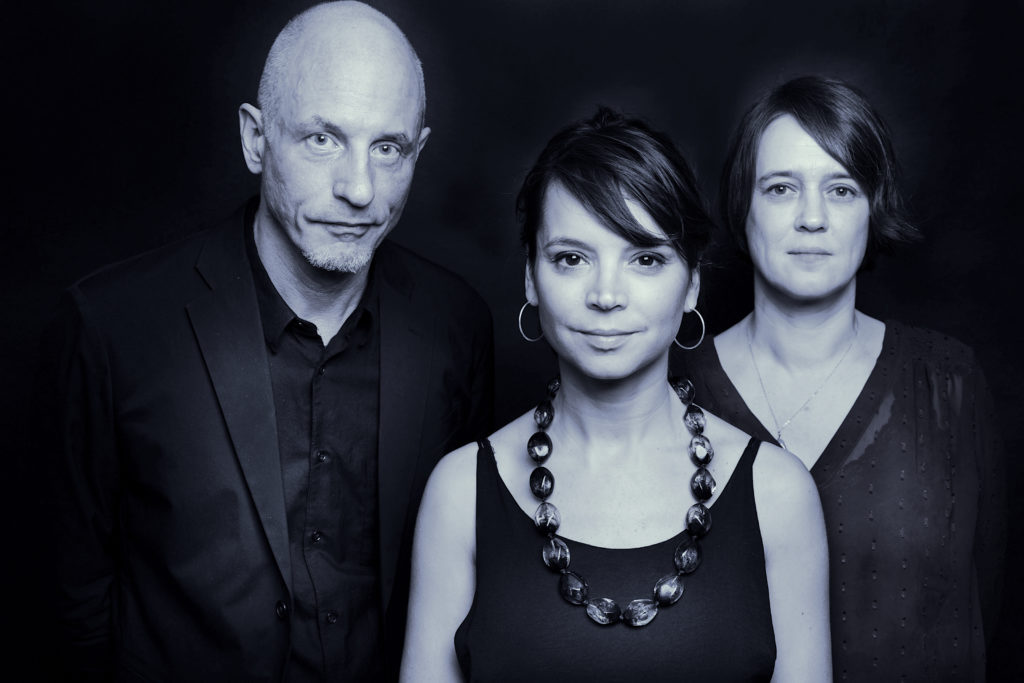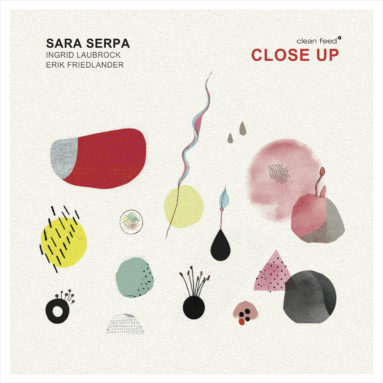
Sara Serpa – voice | composition
Ingrid Laubrock – tenor | soprano saxophone
Erik Friedlander – cello
CLOSE UP IN BEST OF 2018 LISTS:
THE 2018 NPR JAZZ CRITICS POLL (#3)
FEMINIST JAZZ REVIEW: 5 BEST RECORDS OF 2018
FAVORITE JAZZ ALBUMS RELEASED IN 2018
MELHORES DE 2018 JAZZ.PT
________________________________
Texts:
“Future” by Virgina Wolf, entry in The Diary of Virginia Woolf: 1915-1919
“Woman” by Luce Irigaray, in Between East and West: From Singularity to Community, 2002
“Pássaros” by Ruy Belo from “Algumas proposições com pássaros e árvores que o poeta remata com uma referência ao coração”, in Homem de Palavras, 1970
_________________________________
(Text from liner notes, written by Sara Serpa)
Close Up can be explained, interpreted, and heard through multiple angles of its creative process and performance.
The configuration of voice, saxophone and cello exposes each instrument in a vulnerability that sometimes verges on discomfort, much like a Close Up photograph that is saturated with detail. As a trio, we are faced with the challenges of finding a way to work together while playing within this hyper-detailed setting and this uneasy close range. From within this exposure, we look for cohesion, and collective sound. I wrote the material, but the music took shape in the process of our rehearsals and the time we spent together, discussing and trying. The recording process, too, continued the concept of exposure. All of us were present in the same room as we recorded, taking away the possibility of correcting mistakes—no chance of going back.
The compositions themselves also reveal Close Ups of different episodes in my life. Each episode as it took place by itself felt simultaneously important and isolated. Put together the episodes create a whole—life itself, with its moments of joy and sadness. The compositions assume the different languages from throughout my life. In English, my adopted second language, there are texts by two women whose writing I greatly admire: Virginia Woolf and philosopher and feminist Luce Irigaray. Portuguese, my mother tongue, appears in “Pássaros”, a poem by the late Ruy Bello, gone too soon. Departure from and avoidance of language is part of my work. When I come to sing or compose, in the moment I lack words, I sing sounds. Sounds that alone find their meaning. The wordless voice becomes another Close Up of a moment, emotion or expression. There are different challenges imposed on the voice in this music – to create a background, to hold down a bass line, to sing long tones that become textures, to traverse complex lines, to find its place without a harmonic instrument, to be independent, to feature as a solo, to act in ensemble. These are all challenging situations, from which I am continually learning: to find the place for my human voice.
Finally, at the time I was writing and working on this music, the film Close Up by Iranian director Abbas Kiarostami appeared in my life. The film was transformative for me, and has stayed alive in my mind as very few films are able to do. It is inspired by real life events and performed by the participants themselves—the people involved in the events become the subjects of the film. Subjects become objects, the viewers become the actors, and the actor(s) become(s) the director(s), as they reenact and reconstruct present and past events. Cinephile Sabzian fraudulently impersonates a well-known Iranian filmmaker to get access to a family’s house and daily private life. With the pretense that the family members and their house are ideal for his new film, he spends weeks in the house until his fraud is eventually discovered and he is taken to court. Sabzian is the anti-hero, in the sense that he lies and deceives. And yet it is impossible to see him as a bad person. The way he naively speaks and behaves shows his humanity and suffering. In the film, while Sabzian is in the courtroom, in a real-life trial, Kiarostami interviews him, showing a Close Up pan of his face. (…)
In Close Up we, together, become actors and directors, performers and listeners, the others and ourselves. You too are part of this process. Thank you for listening.
